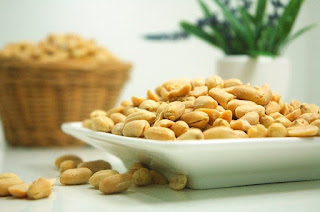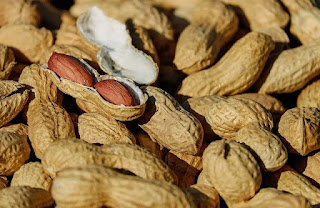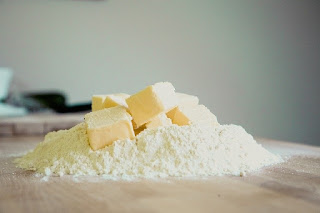A wide range of persons perceive peanut to be unhealthy food. To some, peanut causes pimple yet to so many others; regular consumption of peanut leads to malaria.
Peanut is an excellent food with high percentage of different nutrients; protein, carbohydrates, fats, vitamins, minerals and antioxidants.
Peanut is a legume we should enjoy and snack on regularly not because of its palatability but due to its loads of nutrients.
Peanuts can be processed into flour which is used as a composite flour along with other types of flour in confectionery.
Read on to find out why you should start consuming peanut and it's products.
What is peanut?
Peanut is a leguminous crop belonging to the pulse family. Crops in pulse family are enclosed in a pod or pulse-like cases.
Examples of other crops belonging to pulse family are peas, soybean, cowpeas (beans) and cocoa et cetera. It's clearer now, right?
Leguminous crops are generally proteinous in nature hence contribute to the recommended daily intake of protein (0.8g gram per kilogram of weight) when consumed.
Peanut is quite different from tree nuts; while most of tree nut are enclosed in fruits peanuts are enclosed in shells. Tree nuts are harder than peanuts.
Another names for peanut include goobers, earthnut or groundnuts.
Uses of peanut
Peanut is used as spread on bread, sandwiches and salad
Peanut butter can serve as the best substitute for salad cream, butter, and mayonnaise for anyone mindful of their health.
Although, peanut contains saturated fats, however, its polyunsaturated and monounsaturated fats content are far greater than saturated fats (100% : 20%).
Hence, peanut butter is the best substitute for salad cream and mayonnaise.
Are you concerned about your heart health? If yes, all you need to do is to replace butter, salad cream and mayonnaise with peanut butter.
Peanut serves as a thickener for making soup
Groundnut soup is a popular delicacy in some parts of the world.
It's a basic ingredients for making soup enjoyed by some tribes.
This soup is prepared by grinding dried peanut into powder / puree which acts as a thickener for the soup.
This is another way to put that extra peanut in your cupboard into use. Or perhaps, a good way of having varieties of healthy meals at your disposal. What do you think?
Peanuts are used as snack
Peanut is one of the commonest snacks enjoy by all. It can be eaten raw or cooked (boiled or roasted). Peanut can as well be processed into peanut butter. These snacks are relished by almost everyone. I'm sure you're not an exception.
Peanuts are used in cooking purposes
Peanut contains high percentage of oil which is extracted and used for cooking purposes like frying, baking and grilling.
Peanuts can be processed into other products
Peanuts can be processed into flour which is used as a composite flour along with other types of flour in confectionery.
I bet you would love to try this out!
Also, peanut flour can be used for supplementing foods low in protein content.
Peanut hulls can be processed into animal feeds, beddings, fertilizers.
Peanut oil may serve as lubricant for food grade milling and grinding machines.
Nutritive values of peanut
It's quite obvious there are varieties of snacks and convenient foods in grocery shelves available for human consumption.
But this begs the question, how healthy and nutritious are these foods?
Peanut is loaded with beneficial nutrients necessary for maintaining good health.
However, majority of consumers lack this knowledge.
Nutritive values of 1 oz of raw peanut
Calories 161Kcal
Fats
Saturated fatty acids 1.8g
Monounsaturated fatty acids 6.9g
Polyunsaturated fatty acids 4.4g
Protein 7.3g
Dietary fiber 2.4g
Total carbohydrate 4.6g Total fats 14g
Vitamins
Vitamin E 2.4mg
Folate 68mcg
Niacin 3.4mg
Thiamine 0.18mg
Riboflavin 0.04mg
Cholesterol Absent
Pantothenic acids 0.5mg
Vitamin B6 0.1mg
Minerals
Zinc 0.93mg
Copper 0.32mg
Selenium 2mcg
Magnesium 48mg
Phosphorus 107mg
Potassium 200mg
Calcium 26mg
Sodium 5mg
Iron 1.3mg
Arginine 0.88mg
And so many other essential fatty acids.
Peanut Allergy
Allergy is a condition whereby someone's immune system becomes hypersensitive or react abnormally to some foods and substances that do not disturb other people.
The substances causing this reaction is called allergens.
Health benefits
Anti inflammatory properties
Some terminal diseases are hinged on inflammation mechanism. The higher the rate of inflammation in one's body system, the higher the possibility of being exposed to chronic diseases.
What most folks don't know is that the kind of food taken contribute greatly to increased inflammation of the body cells.
Loads of nutrients in peanuts position it as good anti inflammatory food.
Linolenic acids (Omega-6 fatty acids) has been shown to reduce inflammation.
Low glycemic-index food reduce inflammation, peanut is one of such foods with high glycemic index.
Studies show that low level of magnesium in the body tend to promote inflammation. Now you know, find a way of including peanut in your diet. Since it's a good source of magnesium.
Promotes heart health
Peanut contains more good fats (monounsaturated fatty acids and polyunsaturated fatty acids) than bad fat (saturated fatty acids). As such peanut is very good for the heart. The unsaturated fatty acids helps in removing LDL cholesterol from the blood. These good fats do not clog arterial walls in other words consumption of at most 42g of peanut daily will go a long way in promoting healthy heart.
Promotes weight loss
I have seen people who wants to lose weight complain they don't eat groundnuts because according to them, it aids weight gain.
Well, that's a fallacy, peanut does the inverse; as a result its wonderful nutrients: goods fats, proteins, fiber and low carbohydrate et cetera.
These nutrients make one to be filled for a longer time before the next meal. In particular the fat and protein in peanut brings about satiety.
Reduces blood sugar
You have heard that peanut has low glycemic-index.
What this simply means is, peanut is not easily metabolized into sugar in the body hence it does not soar blood sugar like most cereal foods do.
The fiber in peanut contributes greatly in this process because it slows down the digestion of peanut.
Diabetic patients who consume peanut daily were able to manage their blood sugar than those who did not savour on peanut.
Good for the skin
I know you already know that vitamin E is good for a healthy skin.
But are you also aware that peanut contains good amount of this vitamin.
Yes! It does.
Peanut nourishes the skin and hair, big time.
Up Next
Food recipe-how to make Peanut Burger
Reference
US Department of Agriculture (2018). Peanut nutrition data. USDA Nutritent Database for Standard Reference.





Waaw.... I really love peanuts though never knew of these benefits, thanks a lot
ReplyDeleteWow. Nice info
DeleteWelcome
Delete